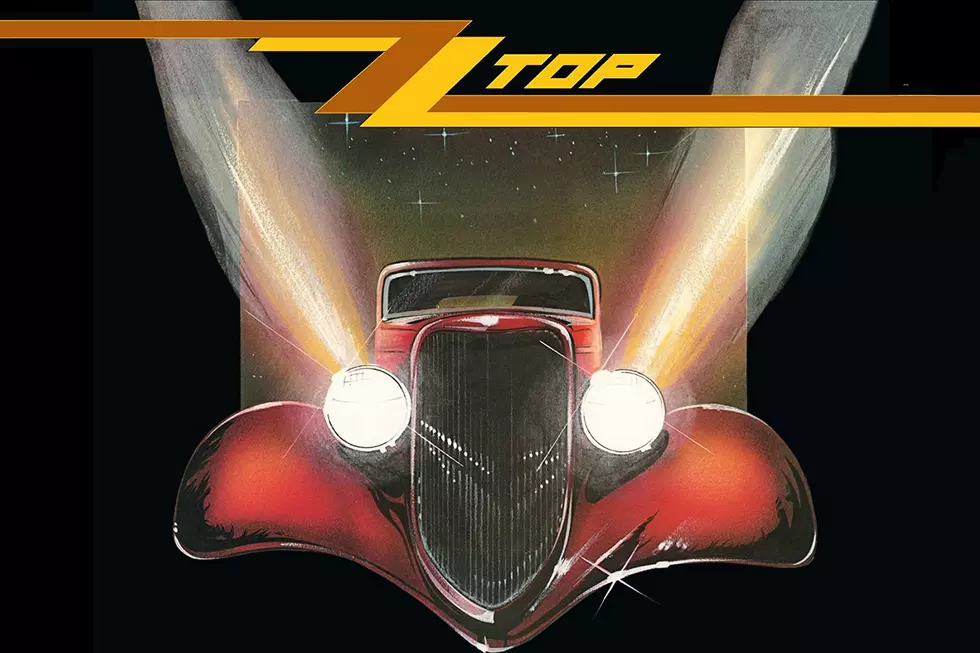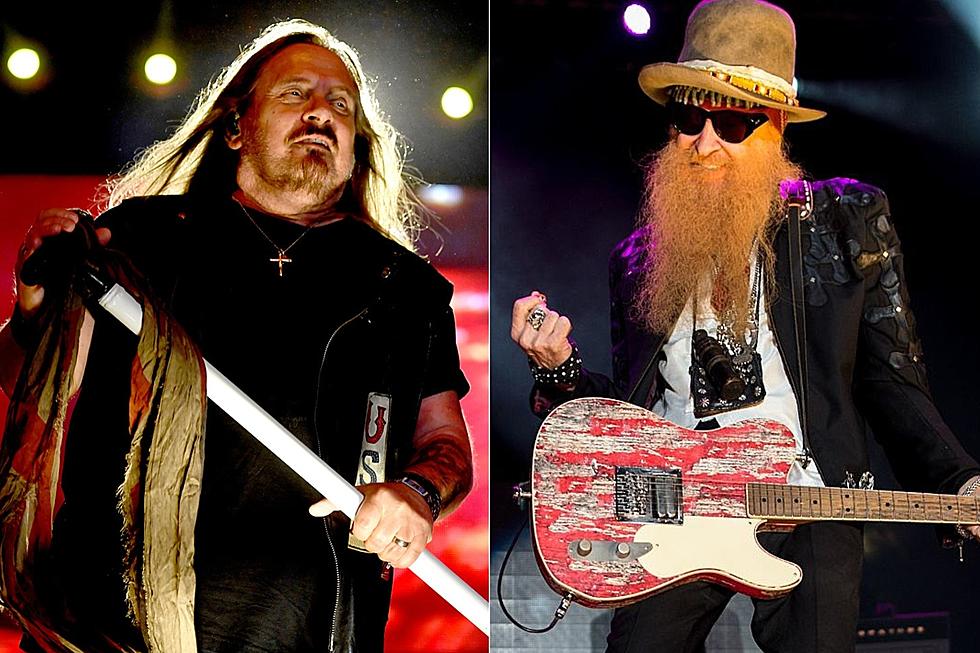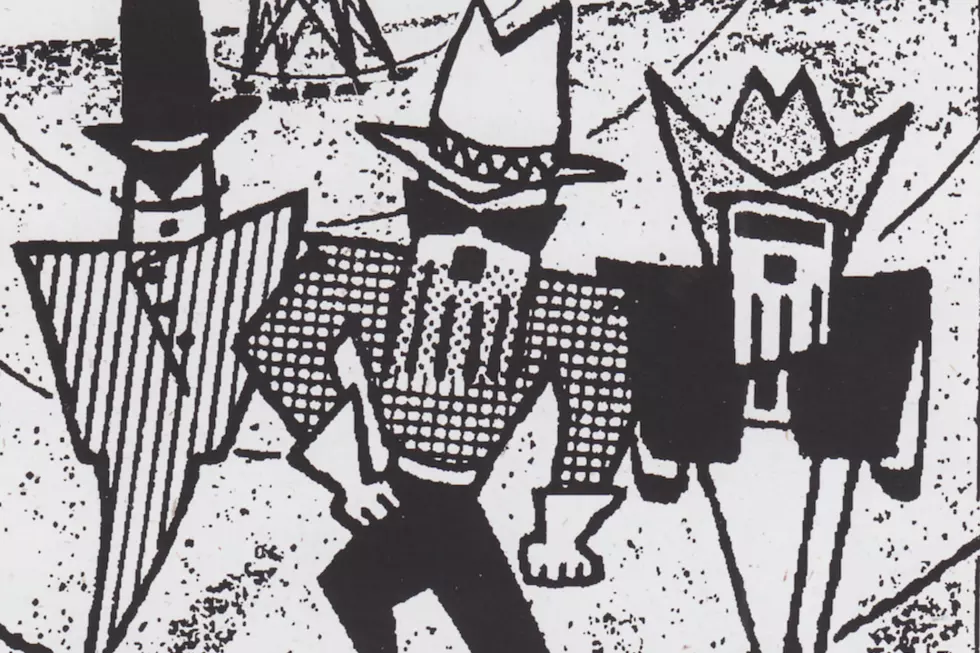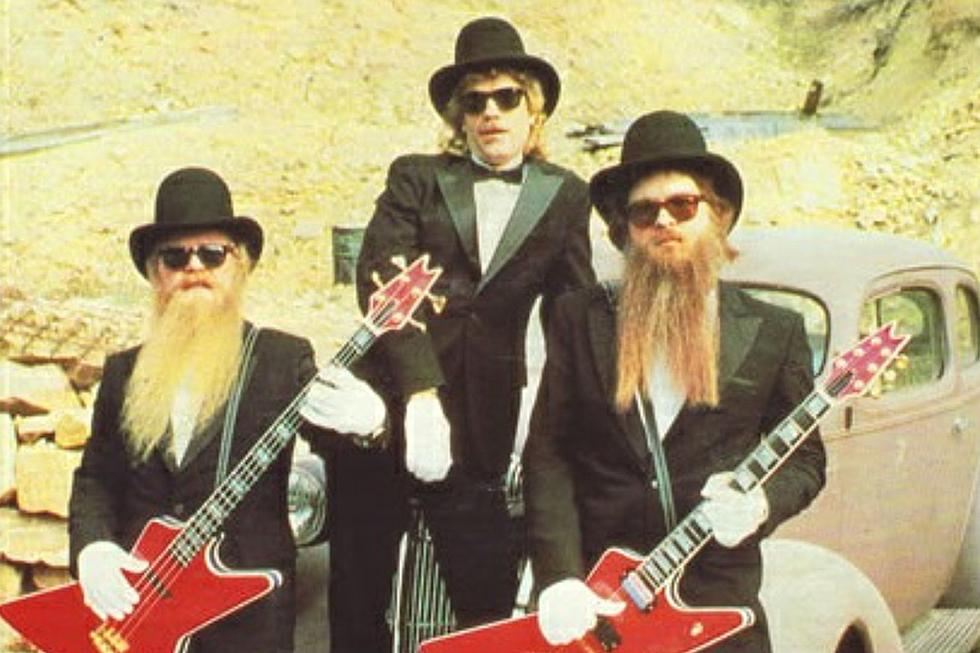
Is ‘Eliminator’ ZZ Top’s Best Album? Our Writers Answer Five Big Questions
To celebrate the 35th anniversary of Eliminator, the daringly innovative album that made ZZ Top household names, we gave five writers all our hugs and kisses and then asked them to answer five big questions about its place in rock history. Here's what they said.
Eliminator is ZZ Top’s best-selling album, having sold more than 10 million copies to date. But is it their best album? Why or why not, and if not what is?
Michael Gallucci: Tres Hombres has a slight edge over Eliminator, mainly because I think it's a better representation of what ZZ Top are all about. I love the way Eliminator took over radio in 1983, but some of it sounds a bit dated now.
Nick DeRiso: It’s a great album, and it’s a fun album, but it’s not their best album. Deguello, though it's brilliant from start to finish, can’t even top Tres Hombres, which will always be ZZ Top’s most complete studio effort. One of that 1973 project's deep cuts said it best: "Hot, Blues and Righteous." By the way, if you want a preview of these oh-so-‘80s sounds, head over to "Manic Mechanic” from Deguello. It’s all there.
Matthew Wilkening: It's a very close three-way race -- I couldn't say this if Tres Hombres or Deguello were playing right now -- but yes, it's the best. I could be biased; this was my introduction to the band. But after listening to all three endlessly, this is the one I reach for most. The singles deserve every rave they get, and the second side doesn't get nearly the credit it deserves. "TV Dinners" and "Thug" explore the band's weird side in a wonderful way, and the final three songs find them leaning into a supercharged and more aggressive version of their '70s sound. Plus, Billy Gibbons' lead guitar playing just shines throughout the whole record -- getting nearly as much time in the spotlight as his vocals.
Michael Christopher: Some will point to Tres Hombres or Degüello, but it all depends on how you like your ZZ Top served: straight-up Texas boogie rock or bluesy with an extra side of synth. It’s sort of like Van Halen pre and post-1984. I think it’s their best -- not just how completely out of left field it was sonically, but because it worked so incredibly well. Even today it sounds so fresh for the most part.
Eduardo Rivadavia: No way. I'd rank Tres Hombres, Rio Grande Mud and maybe even Deguello higher than Eliminator, in the grand scheme of ZZ Top's career discography. However, Eliminator has to be one of the most remarkable feats of re-branding in the classic rock era. While most '70s bands were killed off by MTV because they were either too old or too ugly, ZZ Top turned both of those liabilities into assets, making music videos that mined their image and especially those long beards for comic relief.
What’s the best song on Eliminator -- and why?
Gallucci: "Gimme All Your Lovin'." It was the first introduction to Eliminator as both its first single and opening track. And it was a perfect showcase for their shiny new upgrade.
DeRiso: "Gimme All Your Lovin’” helped shape the hair-band musical aesthetic, "Sharp Dressed Man” defines the Eliminator sound and “Legs” set the template for cheesy teen-fantasy videos. Unfortunately, after decades of heavy rotation both on radio and (especially back then) MTV, those songs have become so ubiquitous that they’ve lost some of their punch for me. The far-lesser-spun "Got Me Under Pressure,” on the other hand, has started to feel like a lost classic.
Wilkening: Can the guitar solo in "I Got the Six" count? It's got it's own chorus and everything! If not, then the effortlessly and endlessly cool "Sharp Dressed Man" gets the nod.
Christopher: It’s hard to find a song more quintessential for the time period that still holds up as “Sharp Dressed Man.” Lyrically, it epitomized the day with a focus on style first, substance later – if at all. “Top coat, top hat, and I don't worry 'cause my wallet's fat” is so perfectly 80s. Musically, it’s catchy as hell, from the first note you just want to strut into the night like old-school professional wrestler Gorgeous Jimmy Garvin, who also happened to use the track as his entrance music when it was released as a single in the summer of 1983.
Rivadavia: I can't settle on just one, but I can narrow it down to the first three. I love the urgent pace and quirky lyrics of "Got Me Under Pressure." No song epitomizes ZZ Top's commercial rebirth for the '80s better than "Sharp Dressed Man." And there's simply no song cooler than "Gimme All Your Lovin'." There's that instantly recognizable opening drum beat, Billy's growling guitar tone, and his lick at 0:26 just kicks the song into another gear. Brilliant stuff.
If you had to cut one song, which would it be and why?
Gallucci: "If I Could Only Flag Her Down." The album loses some steam by the end, and as Eliminator's second-to-last song, this comes off as a throwback and afterthought after the rest of the LP's forward-thinking momentum.
DeRiso: How many signature albums finish with a thud, a throwaway song that feels tacked on? One of them, unfortunately, is Eliminator, which ends with a by-the-numbers, entirely forgettable slice of boogie-rock called "Bad Girl.” On a project simply bursting at the seams with next-gen ideas – there wasn’t even a word for it back then: space-age pop-metal? New Wave blues? This track feels boringly retrograde.
Wilkening:
If a child's life is at stake or something, "If I Could Only Flag Her Down," but only because it sounds like it belongs on a different excellent ZZ Top record.
Christopher: “Thug” ambles aimlessly and is one of the only songs on the record that sounded dated before Eliminator even hit the shelves.
Rivadavia: I'm tempted to chop "I Got the Six," because it's totally overshadowed by Dusty Hill's other Eliminator lead vocal on "Bad Girl," but I'm going to go with "Thug," instead, because it's one of the few tracks where the electronics really get in the way, for me, and that lonely bass slapping is only cool the first time you hear it.
What do you say to the "keyboards ruined ZZ Top" believers?
Gallucci: ZZ Top needed something to make them interesting by the early '80s. Their take on boogie blues was lost in another era; the keyboards injected their music with an electricity that was missing from most of their recent albums.
DeRiso: I guess you had to be there.
Wilkening: I'd hope they were talking about later albums, at least. And okay, they got stuck in a digital rut for a little while there, but some really awesome songs came out of their post-Eliminator exploration. "Sleeping Bag" is amazing, half of Afterburner is great and I wouldn't want to live in a world without "Pincushion," "Fuzzbox Voodoo" or "My Head's in Mississippi."
Christopher: They’ve got it backward. Keyboards saved ZZ Top. The trio was already experiencing a decline in popularity, on the charts at least, at the dawn of the '80s. Introducing keyboards made them relevant and managed that elusive second act. Blues-rock purists will forever deride the move as embracing a passing trend, but putting keyboards at the forefront not only widened the ZZ Top fan base, it showed their dexterity as musicians. There are still plenty of nasty guitar licks on Eliminator, though you had to dig a bit deeper into side two to find them.
Rivadavia: I say the electronic drums were even more damaging -- if not so much on Eliminator, then certainly on those early albums reissued on CD with re-recorded drums. That's gotta be one of the biggest travesties in the annals of classic-rock reissue programs. As for the keyboards, I guess they definitely marred subsequent albums, to one degree or another (crappy songwriting was equally to blame), but I hardly notice them on Eliminator, which I heard at such a young age, I hadn't developed my (snob) ears yet.
How successful do you think the album would have been without MTV?
Gallucci: Not nearly as successful, but I think it still would have been one of the band's bestselling albums. Eliminator sounds like a leap of faith, and I think more open-minded fans, and plenty of new ones, would have been on board either way. But there's no denying the impact of those around-the-clock videos. It's really hard to separate them from the music now.
DeRiso: Certainly, ZZ Top’s knack for distinctive imagery -- the furry guitars, the Space Shuttle hooptie car, the beards (seriously, nobody on MTV had beards back then) – helped sell this canny update of their Texas blues-rock sound to the masses. But the truth is, these songs hold up quite well without all of those bells and whistles. It may have been a slower ride to the top, but I like to think ZZ Top would have made it there anyway.
Wilkening: We'd still have electricity right? Obviously you'd cut the sales total in half or something crazy like that, but those singles still would have found a permanent home on rock radio.
Christopher: Not even remotely as successful. As part of their synth-makeover, ZZ Top offered themselves up as characters in video clips that became synonymous with the channel. The spinning and furry guitars, long beards, sunglasses and that shiny, magical twin Z’s keychain all remain iconic to this day. Without MTV, the band would’ve been shunned by radio programmers who probably considered them traitors and fad chasers. Instead, the songs they turned into videos were some of the most requested on the dial of the decade.
Rivadavia: Nowhere near as successful, though I'm sure radio airplay would have reached some younger fans and that the altogether stellar songs would have won over enough of the old timers, in spite of the synths, to push the album as far as platinum. You can forget about the (gulp!) diamond-certified sales plateau, though -- no beards were long enough to achieve that without MTV's timely intervention.
ZZ Top Albums Ranked
More From Ultimate Classic Rock









